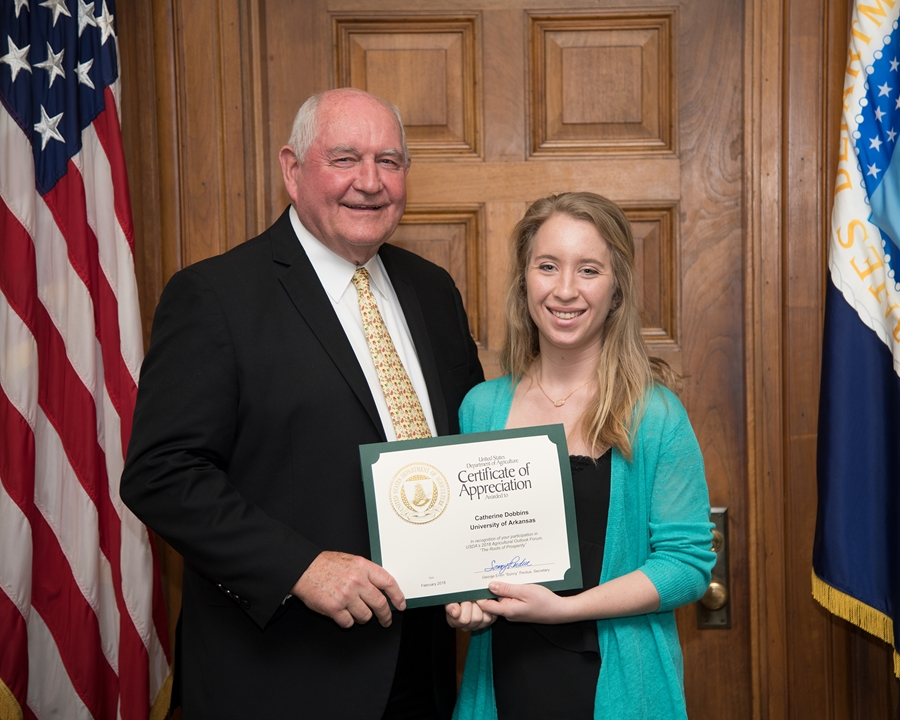
FAYETTEVILLE, Ark. – Catherine "Katie" Dobbins, a master's degree student at the University of Arkansas, was one of just 10 graduate students and one of 30 overall from across the country named winners of this year's USDA Student Diversity Program.
They won a week-long stay in Washington, D.C., to attend the U.S. Department of Agriculture's 94th annual Agricultural Outlook Forum, the USDA's largest annual meeting, in February at the Crystal Gateway Marriott Hotel in Arlington, Virginia. The theme of this year's meeting was "The Roots of Prosperity."
Dobbins is pursuing her master's degree in agricultural and extension education in the Dale Bumpers College of Agricultural, Food and Life Sciences. A native of Maumelle, she earned her bachelor's degree in Spanish and a minor in biology from Hendrix College in 2013.
In its 11th year, the USDA Student Diversity Program gives undergraduate and graduate students real-world learning opportunities in contemporary agribusiness, scientific research and agricultural policy. The program selects 20 undergraduates and 10 graduate students based on essays on agricultural careers and challenges. Students major in agriculture-related studies, including business, economics, communications, nutrition, food science and veterinary studies. Finalists are selected from land-grant universities, Hispanic-serving institutions and non-land-grant colleges of agriculture. During their visit, students took part in a USDA briefing and discussion of career opportunities with agriculture leaders in academia, government and industry, and toured the nation's capital.
Dobbins' essay was "Exploring the Intersections and Interdisciplinary Nature of Agriculture: The Greatest Challenge For the Next Five Years." It focused on increasing diversity in agriculture by recruiting people of different cultures, backgrounds and academic disciplines to work together in solving the greatest issues facing agriculture.
The Student Diversity Program is supported by academic and government institutions and corporations dedicated to promoting the education of the next generation of agriculturalists.
The forum attracts as many as 2,000 attendees, and highlights issues and topics within the agricultural community, and offers a platform for conversation among producers, processors, policymakers, government officials and non-governmental organizations, both foreign and domestic.
About the Dale Bumpers College of Agricultural, Food and Life Sciences: Bumpers College provides life-changing opportunities to position and prepare graduates who will be leaders in the businesses associated with foods, family, the environment, agriculture, sustainability and human quality of life; and who will be first-choice candidates of employers looking for leaders, innovators, policy makers and entrepreneurs. The college is named for Dale Bumpers, former Arkansas governor and longtime U.S. senator who made the state prominent in national and international agriculture.
About the University of Arkansas: The University of Arkansas provides an internationally competitive education for undergraduate and graduate students in more than 200 academic programs. The university contributes new knowledge, economic development, basic and applied research, and creative activity while also providing service to academic and professional disciplines. The Carnegie Foundation classifies the University of Arkansas among only 2 percent of universities in America that have the highest level of research activity. U.S. News & World Report ranks the University of Arkansas among its top American public research universities. Founded in 1871, the University of Arkansas comprises 10 colleges and schools and maintains a low student-to-faculty ratio that promotes personal attention and close mentoring.
Topics
Contacts
Robby Edwards, director of communications
Dale Bumpers College of Agricultural, Food and Life Sciences
479-575-4625,